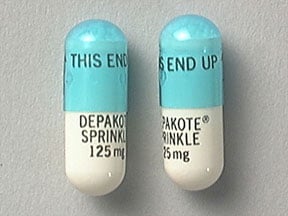
Depakote Sprinkles Coupons & Savings Card – Discount Prices from $12.03
Brand for: Divalproex
My prescription
Edit
125MG, Divalproex (180 Capsule Delayed Release Sprinkles)
Select pharmacy

CVS
$38.56
COUPON PRICE
Walgreens
$12.03
COUPON PRICE
Albertsons
$50.27
COUPON PRICE
Walmart
$54.87
COUPON PRICEDepakote Sprinkles savings card
Show this card to your pharmacist
Walgreens
$12.03
BIN
ID
PCN
GRP
015995
LHKPY241783
GDC
DR33
Powered by
More prescriptions for migraine
More prescriptions for migraine
Price history for Depakote Sprinkles (brand) & Divalproex (generic)
180 Capsule Delayed Release Sprinkles, 125MG
Average retail price for Depakote Sprinkles
Average retail price for Divalproex
Average SaveHealth price for Divalproex
Our price history data is based on aggregated prescription data collected from participating pharmacies in America. Our prescription data updates daily to reflect the latest price changes. If you notice a missing data point, it means there wasn't sufficient data available to generate a monetary value for that date.
Over the last 12 months, the average discount price of Depakote Sprinkles is $50.37 using the SaveHealth savings card. That's an average savings of 65.26% on Depakote Sprinkles with our discount card.
*Retail prices are based on pharmacy claims data, and may not be accurate when we don't have enough claims.
Depakote Sprinkles (Divalproex) dosage forms
Dosage Quantity Price from Per unit 125MG 180 Capsule Delayed Release Sprinkles $39.80 $0.22 125MG 1 Capsule Delayed Release Sprinkle $2.75 $2.75 125MG 30 Capsule Delayed Release Sprinkles $10.15 $0.34 125MG 50 Capsule Delayed Release Sprinkles $15.24 $0.30 125MG 100 Capsule Delayed Release Sprinkles $25.80 $0.26 125MG 500 Capsule Delayed Release Sprinkles $63.80 $0.13 125MG 1000 Capsule Delayed Release Sprinkles $101.30 $0.10
| Dosage | Quantity | Price from | Per unit |
|---|---|---|---|
| 125MG | 180 Capsule Delayed Release Sprinkles | $39.80 | $0.22 |
| 125MG | 1 Capsule Delayed Release Sprinkle | $2.75 | $2.75 |
| 125MG | 30 Capsule Delayed Release Sprinkles | $10.15 | $0.34 |
| 125MG | 50 Capsule Delayed Release Sprinkles | $15.24 | $0.30 |
| 125MG | 100 Capsule Delayed Release Sprinkles | $25.80 | $0.26 |
| 125MG | 500 Capsule Delayed Release Sprinkles | $63.80 | $0.13 |
| 125MG | 1000 Capsule Delayed Release Sprinkles | $101.30 | $0.10 |
What is Depakote sprinkles used for?
Depakote Sprinkles are used to treat seizure disorders, specifically complex partial seizures and simple and complex absence seizures. They are also used for the prevention of migraine headaches and the treatment of manic episodes associated with bipolar disorder.
Can depakote sprinkles be opened?
Yes, Depakote Sprinkles capsules can be opened and the contents can be sprinkled onto a small amount of soft food, such as applesauce, for easier ingestion. It is important to consume the mixture immediately and not chew the granules. Always follow the healthcare provider's instructions regarding medication administration.
Can you swallow depakote sprinkles?
Yes, Depakote Sprinkles can be swallowed whole. Alternatively, they can be opened and the contents sprinkled onto a small amount of soft food, such as applesauce, and consumed immediately. It is important not to chew the sprinkles to ensure proper release and absorption of the medication.
Can you swallow sprinkle capsules?
Sprinkle capsules are designed to be opened and their contents sprinkled onto soft food or liquid for easier ingestion, especially for those who have difficulty swallowing pills. However, they can also be swallowed whole if the person is able to do so comfortably. It is important to follow the specific instructions provided by the healthcare provider or the medication's packaging.
What is depakote sprinkle?
Depakote Sprinkle is a formulation of the medication valproic acid, which is used to treat seizure disorders, bipolar disorder, and to prevent migraine headaches. The "sprinkle" form allows the medication to be opened and sprinkled onto soft food, making it easier for individuals who have difficulty swallowing pills.
